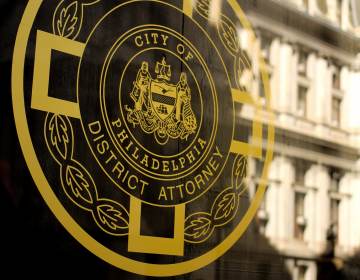Designed for green play, a South Philly schoolyard wins recognition
“It was an empty lot; concrete,” said Irene McKallop. “There wasn’t anything there. It was nothing, it was all cement.”
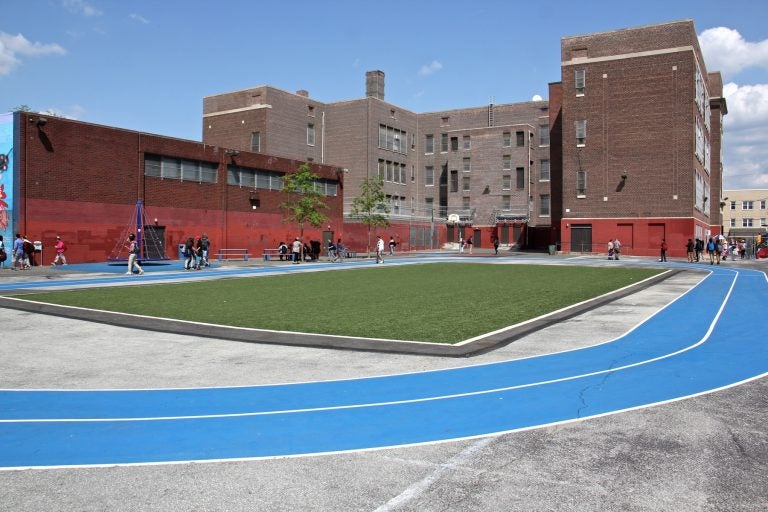
An astroturf field and track direct rainwater runoff toward a containment basin in the Taggart School playground in South Philadelphia. (Emma Lee/WHYY)
“It was an empty lot; concrete,” said Irene McKallop. “There wasn’t anything there. It was nothing, it was all cement.”
McKallop is not talking about a parking lot. She’s talking about the place where her grandkids’ go for recess, gym class and pretty much all other outdoor activities that unfold at their South Philadelphia school, John H. Taggart.
But now there’s much more than cement. The school’s nearly 600 pre-K to 8th grade students play soccer and football in a two-year-old turf field, shoot hoops on a basketball court and run on a well-maintained track. There is a merry-go-round, sitting areas for outdoor classes and a stage for presentations.
Three raised garden beds double as teaching tools for science teachers and vegetable plots for the refugee and immigrant families from Southeast Asia, Africa, Latin America, Mexico, and lately, Puerto Rico, whose children attend the school. On weekends and after school hours, Nepali and other Southeast Asian mothers flock to the schoolyard to plant crops from their home countries.
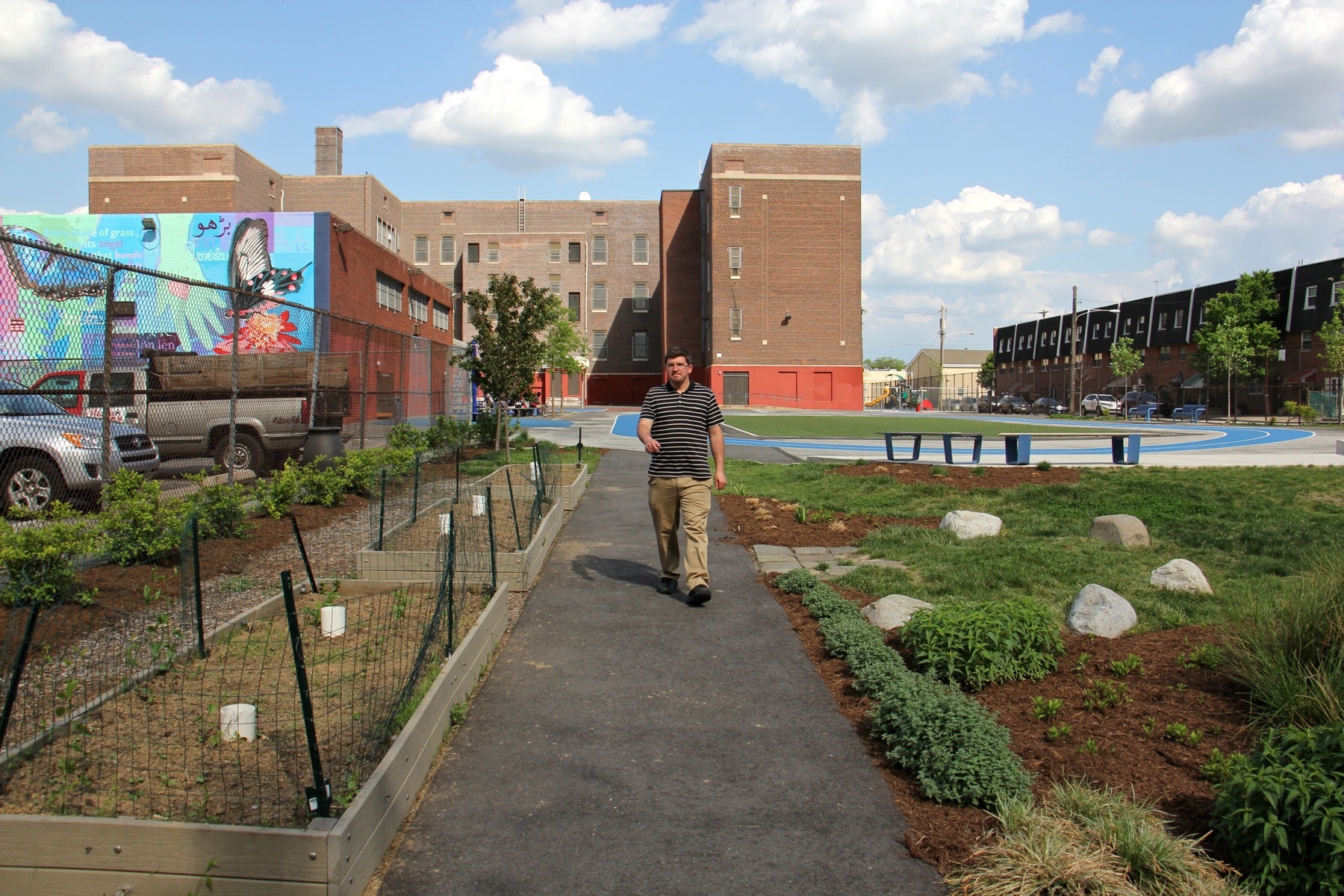
A rain garden with a pond blooms along the perimeter of the Pennsport school’s brick exterior. Seventeen trees, 39 shrubs, and more than 500 perennial and grasses have been planted.
A big improvement, says McKallop, and one that is gaining recognition across the region.
Renovated in 2016 through a partnership between the School District of Philadelphia, Philadelphia Water Department, and the Trust for Public Land, a national nonprofit, Taggart’s schoolyard is now competing in the final round of an annual green infrastructure competition. Run by the Green Stormwater Infrastructure Partners of the Sustainable Business Network of Greater Philadelphia (SBN), the competition recognizes projects that excel in meeting triple bottom line goals. The schoolyard is one of three finalists in its public space category. But more than just a model of green infrastructure, the space is an example of what happens when you ask kids to design the places where they play.
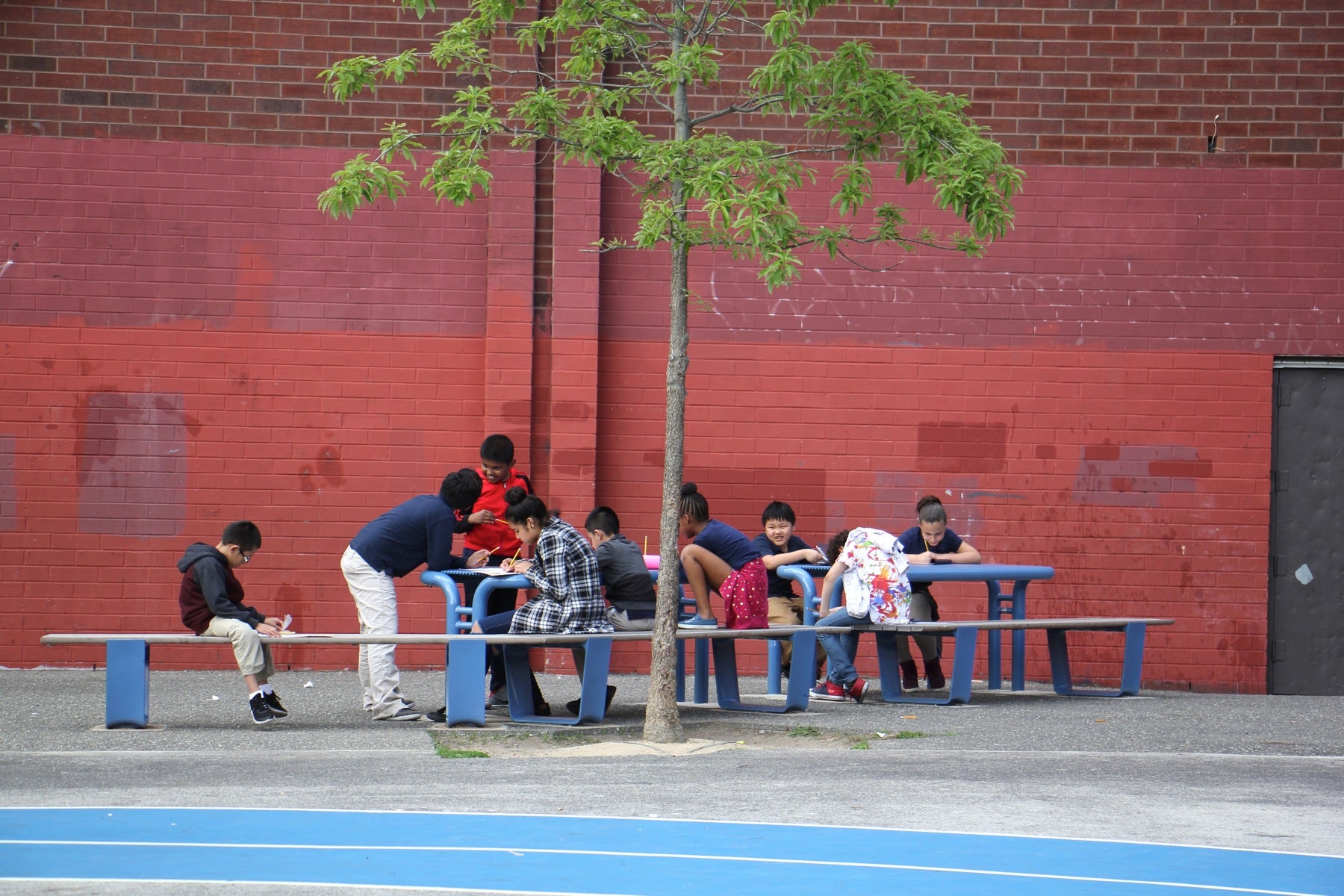
Some 400 students participated in the design process with ideas for the schoolyard of their dreams, and a group of 30 students from 4th, 5th, and 6th grades were active members of the design team, according to Gretchen Trefny, project manager from the Trust’s Parks for People initiative.
Trefny said the young people learned term like impervious and combined sewer overflow, which describes what happens when heavy rains flood the sewer system and send polluted wastewater into the region’s rivers and creeks. One lesson involved depictions of wastewater coming from people’s bathrooms flowing directly into the river. Trails of glitter represented the dirty bathroom water. “It really changed their minds about it, they were saying ‘well, maybe I don’t need to take a shower while it’s raining,’” Trefny said.
The process also changed the way some students perceive nature.
“I remember we talked about grass, and about rolling in the grass, and one child said ‘I don’t want to roll in the grass, why would you want to roll in the grass? It’s dirty’,” Trefny said. “We’re hoping [with this garden] they can get a new experience of grass as something clean, and beautiful, and cool — as opposed to what they see next to the sidewalk.”
It’s not only perceptions that are changing. By using permeable soils, the yard now absorbs stormwater that used to run into the streets and create puddles, leading to flooding. The soil prevents the rain from overwhelming the combined sewer system of the neighborhood, and ultimately, reduces the amount of wastewater going into the Delaware watershed on heavy rain days.
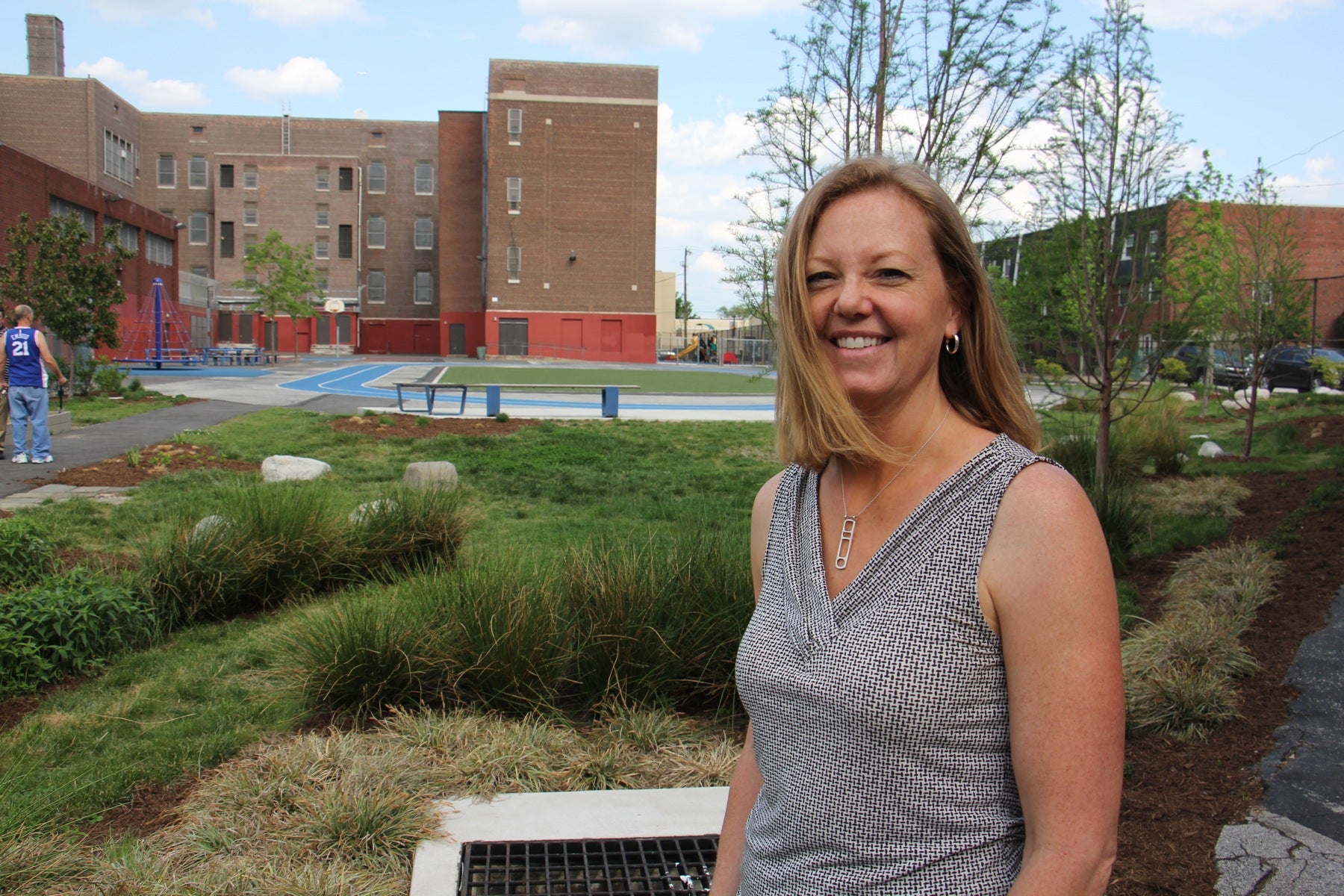
“It’s about 25,000 square feet of water that we’re capturing,” said Trefny. “This is helping keep thousands of gallons of cleanish stormwater out of our combined sewer so that the wastewater goes where it needs to go — into the water treatment plant, and not into the river.”
David Hasel is Taggart’s dean of students. He said the improved schoolyard has been transformative for the school. And the garden, he said, provides some children their only opportunity in a given day to be surrounded by green.
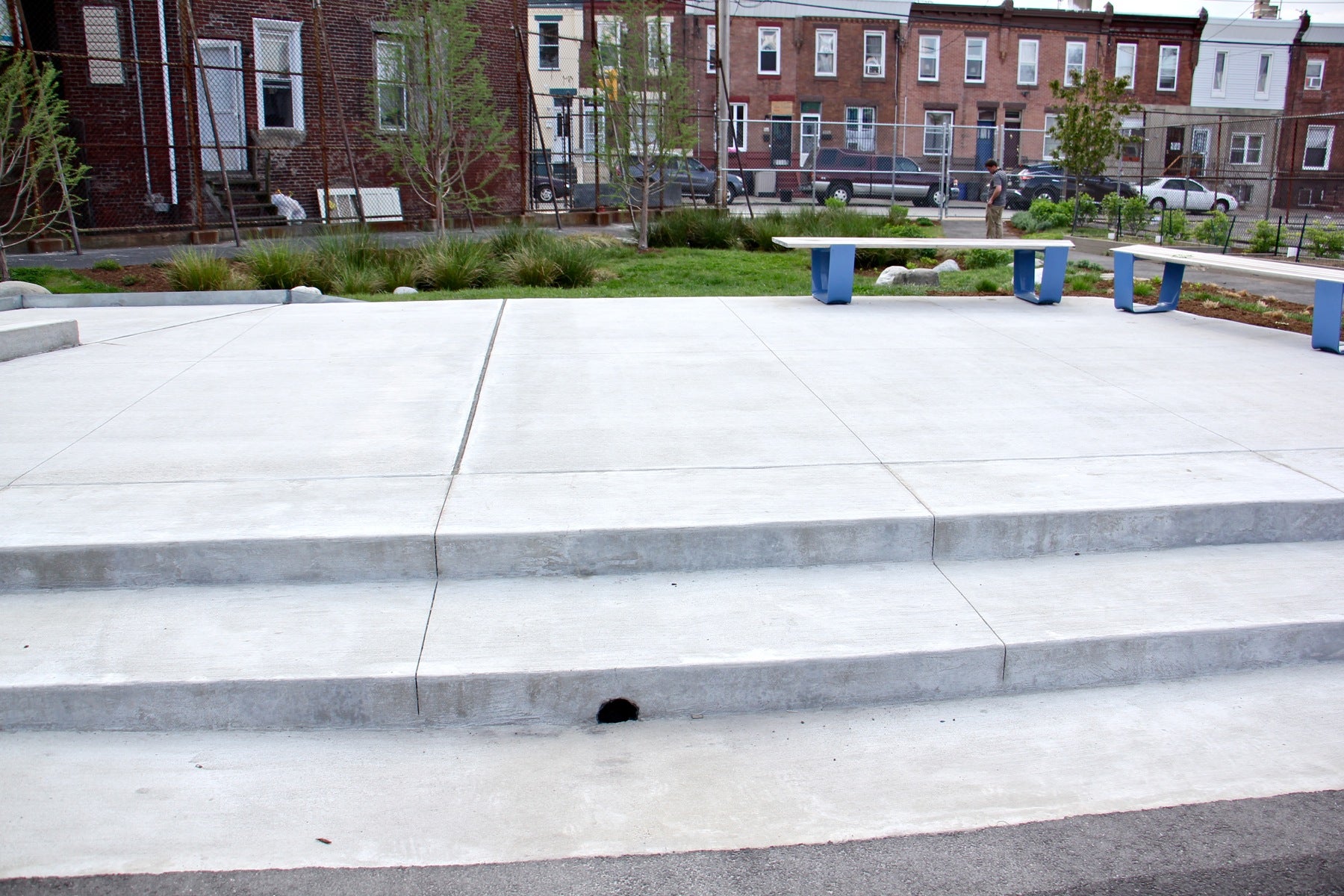
“Just seeing the kids smiling, and happy, and really enjoying it… it makes a world of difference,” Hasel said. “They get to play football and soccer out in the grass, I spin them around on this — we call it the spinny thing, they love to play basketball… they didn’t have any of that before. They love it.”
Healthy play for kids, the watershed, and the city
A national leader in green stormwater infrastructure, the Philadelphia Water Department (PWD) has played a role in projects like Taggart across the city.
Another finalist in the public space category for the 2018 Excellence in GSI Awards can be found in North Philadelphia. The Jose Manuel Collazo playground in Fairhill was a collaboration between Philadelphia Park and Recreation, PWD, The Trust for Public Land, and HACE. Together, the groups renovated the park created in 2001 on a former industrial site and dedicated to Collazo, a 10-year-old Puerto Rican child who was abducted, tortured and killed in a nearby abandoned factory in 1974.
Harry Tapia, HACE’s director of operations, said the old park was run down, and not working for the community. “The swings were all unusable, the matting in the floor was unusable, the basketball nets were down, the jungle gym didn’t even work, it was falling apart,” he said. The surfaces were also 99 percent impervious.
The organizations did a series of meetings and interviews to find out how neighbors wanted to see the space improved. They recorded personal stories that were shared using a mobile storytelling station. With a design informed by the community’s feedback, the new playground opened last summer. Neighbors love it, according to Tapia.
“It’s one of the parks that gets the most use in the city. It’s a really, really active park,” Tapia said. “I think everybody is really happy with the design. It provides shade, and of course, we would like more green, but we’re limited by the space.”
He believes the playground’s popularity has helped make it a safer place to play. “In most parks of the city, needles are a problem,” he said. “And we don’t have that problem at this playground because it’s used so much, that people don’t use it for the wrong reasons.”
GSI’s third finalist is Linwood Park, in the Township of Lower Merion. The one-acre park used to be a parking lot, but the surrounding community persuaded the township to purchase it and transform it into a green community space. The result is a zero run-off park, with the first rain garden in the township.
“It was a big deal because it was very unusual. They really were not accustomed to seeing planted area right on the street, that was open and stormwater was flowing in it,” said Sara Pevaroff Schuh, principal at Salt Design Studio. “Since then, you’re seeing a lot more [rain gardens] being proposed in Lower Merion.”
GSI Partners will announce the winners of the Sustainable Business Network competition on Thursday, May 17, at an awards ceremony to be held at Fringe Arts in Philadelphia. The city’s deputy water commissioner who leads Green City, Clean Waters, Marc Cammarata, will keynote the event.
WHYY is your source for fact-based, in-depth journalism and information. As a nonprofit organization, we rely on financial support from readers like you. Please give today.




